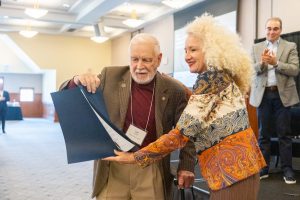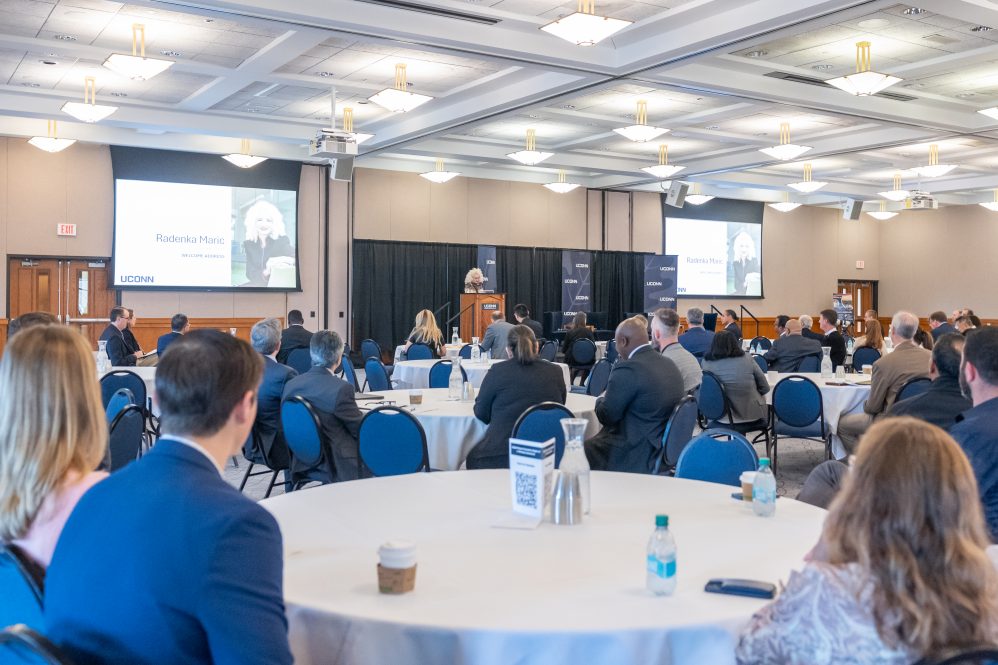Scores of esteemed industry leaders, researchers, entrepreneurs, and public officials came together at UConn Storrs recently to share ideas on combining their organizations’ energy and expertise to grow a robust, sustainable Connecticut economy.
“UConn Forum: Economic Engine of a Thriving Connecticut” featured discussions on driving the state’s economy through several key growth areas including advanced manufacturing, sustainable energy, fintech, biotech, quantum computing, artificial intelligence, and other realms.
Panelists and participants praised the Oct. 31 event as a unique opportunity to learn about innovations in various industry sectors and inspire ideas for collaboration, including by drawing on UConn expertise.
With an annual impact of $8.5 billion on the state’s economy, UConn takes its responsibilities seriously to help drive Connecticut forward, President Radenka Maric told the crowd in welcoming remarks.
That includes sharing its research expertise, helping foster startup businesses and technologies, ensuring its graduates are entrepreneurial and workforce ready, and doing all within its power to keep them in Connecticut to build their careers and lives.
A common theme throughout the day’s discussions was Connecticut’s innovative spirit and enviable strengths, including a well-educated workforce, diverse population, strong schools, family-friendly quality of life, and innovation-oriented business ecosystem.
Forum participants also agreed it’s a perfect time to accelerate the collaborations between industry and higher education – particularly as Connecticut is regaining population lost during the recession; has seen a noteworthy jump in business startups; and is developing new technologies in several fields.
“What we’re seeing is that the trends have reversed in a pretty meaningful way. People are betting on Connecticut with both their wallets and their feet,” said keynote speaker Daniel O’Keefe, commissioner of the Connecticut Department of Economic and Community Development (DECD).
He said the state had the 19th best-performing economy nationwide in the last two years. That’s a major turnaround from the 2000s-era recession in which Connecticut became one of only three states – including Wyoming and Mississippi – whose economies contracted and became smaller on an inflation-adjusted basis.
As Connecticut’s manufacturing and national defense-related industries bounced back, so did the state – supplemented by growth in areas such as technology and software information, and other emerging industries such as those discussed at the UConn forum.
“This is a state where innovation happens literally every day. You don’t hear about it as much as you do in places like Silicon Valley because the innovation is taking place not only in our startups, but also in our incredibly large companies,” O’Keefe said.
Several new collaborations also have immense promise, such as the QuantumCT public-private partnership led by UConn and Yale.

That initiative aims to win federal funding to transform Connecticut into the nation’s leading accelerator of quantum technologies. The proposal recently advanced to the competition’s next stage, and marks the first time that UConn and Yale have partnered on an initiative of this scope.
That kind of collaborative thinking underscored most of the forum’s panels, in which the speakers discussed the importance of addressing society’s emerging needs for sustainable clean energy, effective and affordable pharma products, innovative use of AI, or other topics.
The forum’s guests also gained inspiration from the entrepreneurial history of the Mashantucket Pequot Tribal Nation as shared by its chairman, Rodney Butler ’99 (BUS).
Having endured generations of forced assimilation and poverty, its members survived economically by selling timber, maple syrup, and other goods until the tribe gained federal recognition in 1983, he said.
With the ability to diversify into more lucrative areas, the tribe opened a high-stakes bingo hall in 1986 and, in 1992, it opened Foxwoods Resort Casino – now the world’s largest such gaming and entertainment venue.
Today, the tribe’s annual economic impact in the state is about $1 billion, and it has expanded into the hospitality business, golf courses, real estate holdings, hotel and golf course development, a pharmaceutical network, sports betting, internet gaming, and other ventures.
It’s a far cry from the early days of selling handmade baskets, picking berries, and hunting snakes to survive economically. The Pequot tribe and UConn have also partnered on several projects, including the development of its hydroponic Meechooôk Farm; research into responsible gaming; and various academic and cultural endeavors.
“The reason we do all of it, and the reason we’re in this room, is to create a thriving and sustainable community,” Butler told the forum’s attendees. “Ours is at Mashantucket. In this room, it’s about Connecticut and dare I say, all of southern New England.”
Also as part of the forum, Maric presented a proclamation from Gov. Ned Lamont to UConn Professor Emeritus Lee Langston ’60 (ENG), one of UConn’s most accomplished engineering innovators.
His career included helping to develop the fuel cells that powered Apollo 11 to the moon. He also was part of a team that helped install the first solar panels at the White House during the Carter Administration, and pioneered gas turbine technologies now used worldwide, including at UConn’s Cogeneration (CoGen) Central Utility Plant.
Langston joined UConn in 1977 as a mechanical engineering professor after more than a decade at Pratt & Whitney. He also served a year as the interim dean of the School of Engineering (now a college), later retiring from UConn in 2003 but remaining active as a professor emeritus.
“His contributions to science and society are immeasurable,” Maric said in presenting the proclamation, adding that she first learned of his expertise in sustainable energy when she was studying for her Ph.D. in Japan.
Maric said the legacy of innovators such as Langston, along with the vision of people at the economic development forum and throughout the state, will be key to its future.
“We make the impossible possible in Connecticut. We are leaders and will continue to lead, and anyone who says we can’t do it in Connecticut will be proven wrong,” she said.



